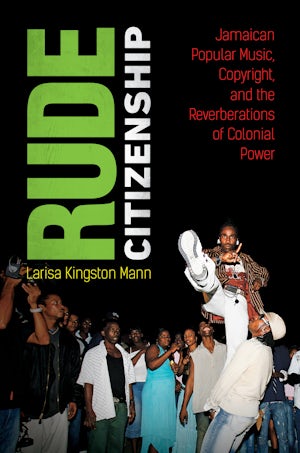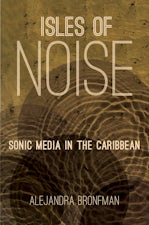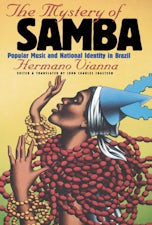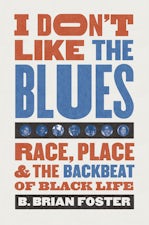Rude Citizenship
Jamaican Popular Music, Copyright, and the Reverberations of Colonial Power
By Larisa Kingston Mann
242 pp., 6.125 x 9.25, 1 table
-
Paperback ISBN: 978-1-4696-6724-9
Published: March 2022 -
Hardcover ISBN: 978-1-4696-6723-2
Published: March 2022 -
E-book EPUB ISBN: 978-1-4696-6725-6
Published: January 2022 -
E-book PDF ISBN: 979-8-8908-6052-1
Published: January 2022
Buy this Book
- Paperback $29.95
- Hardcover $95.00
- E-Book $23.99
For Professors:
Free E-Exam Copies
Awards & distinctions
Certificate of Merit, 2023 Best Historical Research in Country, Folk, Roots, or World Music, Association for Recorded Sound Collections
Because many working-class and poor people are cut off from the full benefits of citizenship on the basis of race, class, and geography, Jamaican music spaces are an important site of social commentary and political action in the face of the state’s limited reach and neglect of social services and infrastructure. Music makers organize performance and commerce in ways that defy, though not without danger, state ordinances and intellectual property law and provide poor Jamaicans avenues for self-expression and self-definition that are closed off to them in the wider society. In a world shaped by coloniality, how creators relate to copyright reveals how people will play outside, within, and through the limits of their marginalization.
About the Author
Larisa Kingston Mann, assistant professor of media studies and production at Temple University, has worked as a performing DJ and event organizer for more than twenty years.
For more information about Larisa Kingston Mann, visit
the
Author
Page.
Reviews
"Interesting, thought-provoking and stimulating. It will guide you through a journey to discover the beauties and secrets of Jamaican music, from the mento of the 50s to the modern era."—Sonic Street Technologies
“Refusing the (re)colonizing gaze, Larisa Kingston Mann departs from ethnomusicological approaches that reduce the practices of peoples of the global South to spectacle and evaluate them in terms of their distance from the North. Her self-reflective ethnography examines Jamaican music production, reception practices, and spaces on their own terms and shows that if these spaces are exilic because of their marginality, they are also sites of autonomy and alternative forms of sovereignty.”—Boatema Boateng, University of California, San Diego
“Placing ethnography in conversation with media and legal history, Larisa Kingston Mann’s study of the theory and practice of copyright law in Jamaica comprises a significant analysis of the understudied intersection of music, law, and legal cultures in the Caribbean. Important reading in a diverse set of fields.”—Alejandra Bronfman, University at Albany, SUNY




